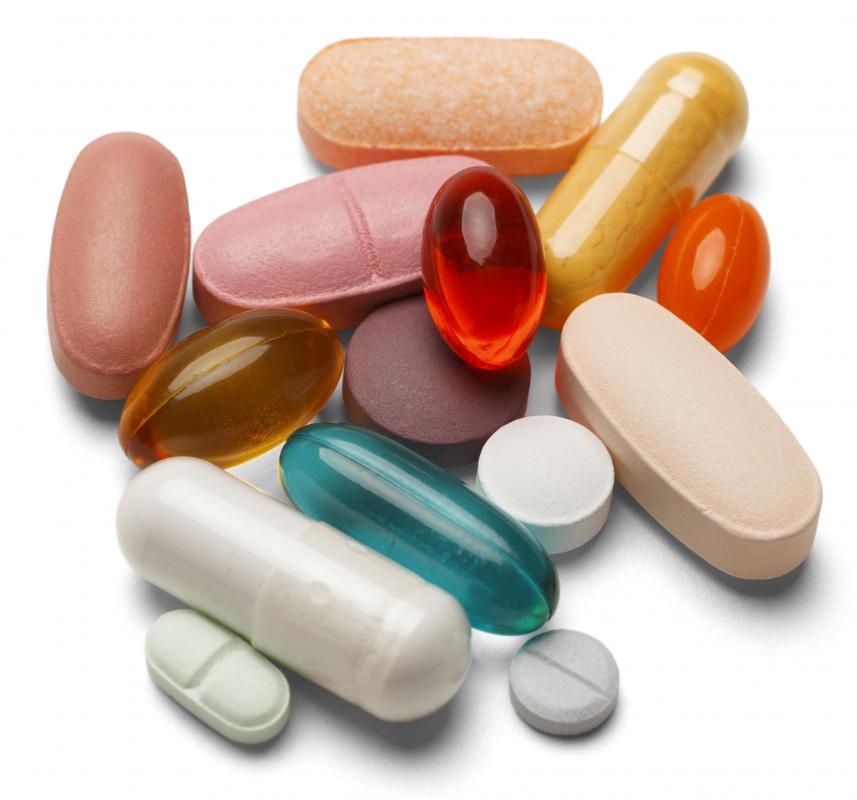At TheHealthBoard, we're committed to delivering accurate, trustworthy information. Our expert-authored content is rigorously fact-checked and sourced from credible authorities. Discover how we uphold the highest standards in providing you with reliable knowledge.
What are Xenobiotics?
Xenobiotics are any chemical compounds that are found in a living organism, but which are foreign to that organism, in the sense that it does not normally produce the compound or consume it as part of its diet. For example, in humans, most drugs are part of this category, since people don't produce them naturally, or consume them under normal circumstances. Xenobiotics can also be defined as substances that are present in higher-than-normal concentrations, or ones that are entirely artificial and did not exist before they were produced synthetically by humans.
A compound that is normal to one organism may be a xenobiotic to another. A commonly used example of this is the effect experienced by fish that live downstream from the outlet of a sewage treatment plant. Hormones produced by humans may be present, even in treated water, and these compounds are foreign as far as fish are concerned.

When an animal produces a toxin as a defense mechanism against predators, these toxins can also be thought of as xenobiotics from the point of view of the predator. Predators can also evolve defenses against these toxins, however. One interesting case in which this has occurred is in the rough-skinned newt and its predator, the garter snake. Tetrodotoxin is a xenobiotic made in the body of the newt, which is usually very poisonous to other animals, but the garter snake has evolved with a resistance to it in order to be able to continue to prey on the newt. It is speculated that as the newt species produced higher and higher concentrations of the poison over generations, the garter snake developed a progressively stronger resistance to it.

When human bodies encounter a such a substance, they remove it through a process called xenobiotic metabolism. Through these processes, the chemical structure of the compound is modified and broken down to either be put to use by the body, or to be detoxified, in the case of some poisons. Sometimes, it is these chemical pathways and their reactions that can be fatal, as is the case with poisoning deaths and harmful drug interactions.

The metabolic pathways that the body uses to process foreign substances have long been a subject of great interest on the part of medical science. It is largely through studying these pathways that new drugs are proposed and developed, especially in the case of chemotherapy drugs used in cancer treatment. They are also important in studying the potential effects of pollutants on an environment, to see whether the chemical will be broken down or remain in the environment and cause harm.
AS FEATURED ON:
AS FEATURED ON:













Discussion Comments
I think the fish have more to worry about than human hormones.
@croydon - Well, to some extent I feel like that's just the way it goes. The article gives the example of evolution between two creatures who were competing.
Well, we are, to some extent, competing with the rest of the environment.
I'm not saying we should shoot ourselves in the foot, but xenobiotic chemicals are a part of nature as well. Animals will either cope with this threat or they won't.
On the other hand I really like being able to eat fish any time I want. Our own selfishness is probably most animals' best chance for survival.
@Iluviaporos - Now that they know that there are compounds in the water that could be damaging fish numbers, they just have to find a way to get them out of the water.
It's in pretty strong concentrations in the fish, which means that it has to be coming from the sewage, since there isn't another way they could be getting exposed to it.
If it was a disease or a xenobiotic that was harming humans, people would have already found a way to deal with it.
And considering how important fish stocks are to the environment, it will indirectly hurt us in the end, so it's in our best interests to deal with it quickly.
Of course, there are thousands of other xenobiotics causing harm in the environment. We make too many substances that can't be removed by normal biodegradation. Mercury levels in fish are another well known example but of course there are many.
Apparently they've been testing the fish in ecosystems near cities and have discovered that they have much higher levels of hormones than usual.
They think it is because of the birth control pill. And, unfortunately, it's threatening fish numbers since they experience infertility when they are exposed to the hormones.
I'm not sure what they can do to stop this. Obviously the normal methods of filtering the water don't work on these hormones or they would already be working.
But the metabolism of these xenobiotics is going to decimate fish numbers in places where the hormones are strongest in the water.
Post your comments